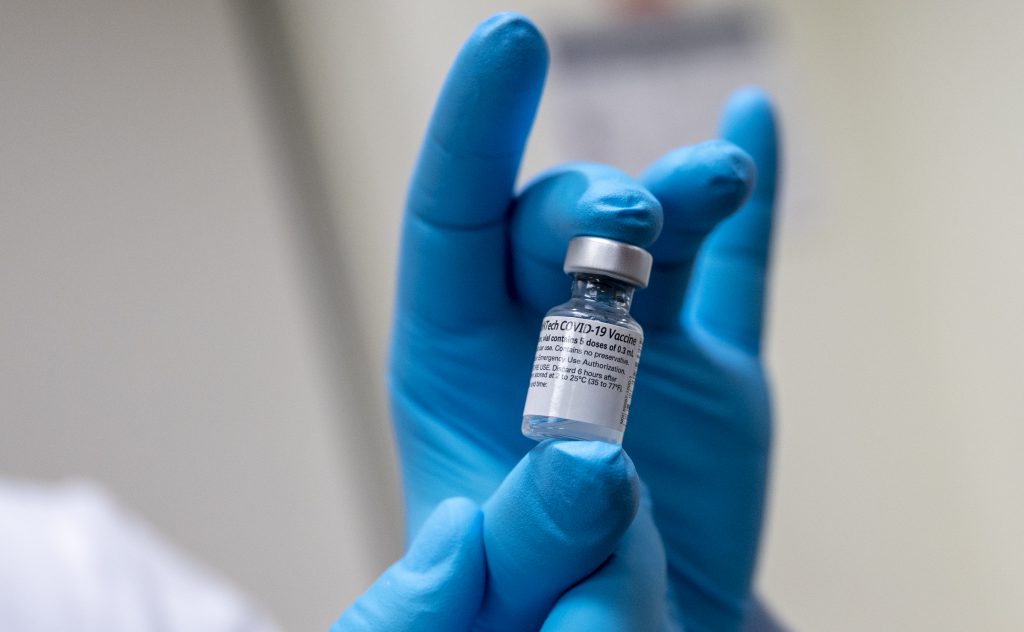Mass Vaccination Bill Clears Committee
One provision would expand vaccination to everyone by March, DHS says bill doesn't address "critical limitation."

Pfizer-BioNTech COVID-19 vaccine. photo by Lisa Ferdinando. U.S. Secretary of Defense, (CC BY 2.0), via Wikimedia Commons
Two bills that would impose new requirements on the state’s COVID-19 vaccination program sailed through an Assembly Health Committee public hearing Wednesday and could head to the Assembly floor as soon as next week.
One measure, AB-4, requires the state Department of Health Services (DHS) to expand the category of professionals authorized to administer vaccines to include pharmacy technicians and students studying to be pharmacists who have taken required coursework on vaccine administration.
In written testimony to the committee, Andrew Hoyer-Booth, legislative director for DHS, pointed out that AB-5 did not address the “critical limitation” that has hampered the vaccine program: the supply of vaccine from the federal government.
Hoyer-Booth wrote that DHS had already submitted a vaccination plan to the federal Centers for Disease Control and Prevention (CDC) in October 2020. That plan outlined the DHS phased rollout for the vaccine “and why it is necessary until supply increases,” he wrote.
“For reference, this plan was shared with the committee following the public hearing last week and it is also available on our website,” the DHS official wrote.
Both bills will go to a vote of the Health Committee next Tuesday, Jan. 26, at 9 a.m., said the committee chair, Rep. Joe Sanfelippo (R-New Berlin), who introduced both pieces of legislation.
The second bill before the committee requires the department to do something that it has, in effect, already done: to allow teams administering the vaccine in nursing homes to also offer it to residents of assisted living or senior housing complexes located on the same campus. That is already happening, a DHS official told the health committee in a public hearing last week.
Another requirement in AB-5 calls for DHS to establish a statewide website that people can use to sign up for the vaccine. Hoyer-Booth said the agency has contracted a vendor to help develop “a comparable system” that will be online in the coming weeks — and that prescriptive language in the bill could wind up costing the state more money if it requires reworking that contract.
Witnesses at Wednesday’s public hearing included representatives of the pharmacy profession, endorsing allowing technicians and students to administer the vaccine. A lobbyist for the pharmacy chain Walgreens, which has a contract to vaccinate nursing home and other long-term care residents in the state, testified in favor of allowing nursing home vaccine teams to also vaccinate assisted living residents on the same site during the same visit, as did the head of an association representing nonprofit nursing homes and other senior housing and long-term care facilities.
Also testifying were representatives of two business lobbies, Wisconsin Manufacturers & Commerce (WMC) and the Wisconsin Grocers Association. Earlier Wednesday, members of the state’s State Disaster Medical Advisory Committee, which has advised DHS on how to prioritize segments of the population for the vaccine, signed off on including grocery workers as part of the current category of “essential workers” to be given the vaccine. Police officers, firefighters and other first responders are already in that category.
Following federal recommendations, DHS has already planned to start giving the shot to people 65 or older starting next week, Rep. Lisa Subeck (D-Madison), the ranking Democrat on the Health Committee, told the Wisconsin Examiner Wednesday following the hearing.
“The bigger issue continues to be vaccine supply,” said Subeck. She blamed the Trump administration’s handling of the vaccine rollout.
“Recent news that an expected increase is not actually available in federal reserves as promised highlights the problem with these sorts of arbitrary deadlines,” Subeck said. “This bill is clearly more about making a political statement than it is about good policy.”
Reprinted with permission of Wisconsin Examiner.
More about the Coronavirus Pandemic
- Governors Tony Evers, JB Pritzker, Tim Walz, and Gretchen Whitmer Issue a Joint Statement Concerning Reports that Donald Trump Gave Russian Dictator Putin American COVID-19 Supplies - Gov. Tony Evers - Oct 11th, 2024
- MHD Release: Milwaukee Health Department Launches COVID-19 Wastewater Testing Dashboard - City of Milwaukee Health Department - Jan 23rd, 2024
- Milwaukee County Announces New Policies Related to COVID-19 Pandemic - County Executive David Crowley - May 9th, 2023
- DHS Details End of Emergency COVID-19 Response - Wisconsin Department of Health Services - Apr 26th, 2023
- Milwaukee Health Department Announces Upcoming Changes to COVID-19 Services - City of Milwaukee Health Department - Mar 17th, 2023
- Fitzgerald Applauds Passage of COVID-19 Origin Act - U.S. Rep. Scott Fitzgerald - Mar 10th, 2023
- DHS Expands Free COVID-19 Testing Program - Wisconsin Department of Health Services - Feb 10th, 2023
- MKE County: COVID-19 Hospitalizations Rising - Graham Kilmer - Jan 16th, 2023
- Not Enough Getting Bivalent Booster Shots, State Health Officials Warn - Gaby Vinick - Dec 26th, 2022
- Nearly All Wisconsinites Age 6 Months and Older Now Eligible for Updated COVID-19 Vaccine - Wisconsin Department of Health Services - Dec 15th, 2022
Read more about Coronavirus Pandemic here




















